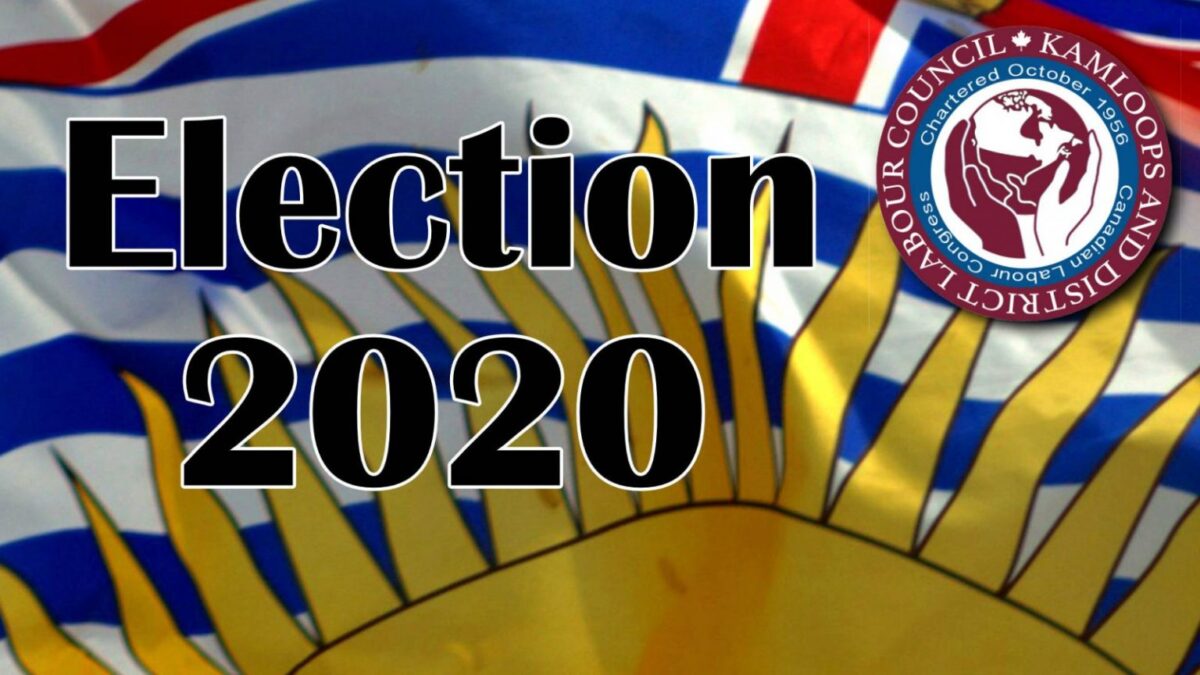
Provincial Election 2020
In an effort to better understand how the candidates in the upcoming provincial election stood on current important labour issues, the Kamloops & District Labour Council composed a set of five questions.
The five questions were sent to all eight of the candidates running in the Kamloops-North Thompson and Kamloops-South Thompson electoral districts.
Question 1
The BC NDP conducted the first review of the BC Labour Relations Code in 27 years and introduced significant changes to the Code in the spring of 2019. However, one of the card based certification system.
What is your position on card based vs. secret ballot votes for Union certification?
If a majority of employees at a workplace sign a card indicating their desire to join or form a union, that should be sufficient to have that group certified. The secret ballot allows for the possibility of employer interference through either persuasion or — in some cases – threats, particularly when there’s a delay between the initial submission to the Labour Board and the holding of the vote.
Anna Thomas – Kamloops-South Thompson – NDP
I prefer the card-based system and was disappointed in the BC Greens. I expected opposition from the Liberals but had hoped the BC Greens would stand up for workers when called to do so and have subsequently been quite surprised by their positioning in this issue. The NDP introduced card check in 1993 and it was a good system, lasting until Gordon Campbell rewarded his business friends by bringing back the secret ballot system in 2001. I support bringing back the card check system—it’s too easy for some employers to try and bully or influence employees prior to a ballot. I’ve seen this happen first-hand amongst members of my family.
Sadie Hunter – Kamloops-North Thompson – NDP
Question 2
Along with changes to the Code, the BC NOP also introduced changes to the Employment Standards Act and eliminated the “self-help” kits which forced workers to first file complaints with their Employer before having access to government assistance.
What do you feel is the most equitable way for Non-Union workers to address workplace issues with their Employer?
Workers who do not have the advantage of union representation should not be forced to complain directly to their employer when they feel their rights under the Employment Standards Act are violated. We shouldn’t have situations where vulnerable workers—particularly young workers—have to confront an employer alone when that employer wields such disproportionate power in the employment relationship. Workers should definitely have access to assistance from the Ministry or the Labour Board without needing to confront their employer first.
Anna Thomas – Kamloops-South Thompson – NDP
The NDP ended the self-help kits because in many cases, it was unsafe for employees to complain to employers—this is particularly true for young or first-time employees who aren’t aware if their rights. Employees, especially in non-union worksites, can feel vulnerable when confronting employers and be concerned that they will lose their job. In my experience, having a neutral 3rd party to register and review complaints is a solution that provides some level of protection for the employee and even for the employer.
Sadie Hunter – Kamloops-North Thompson – NDP
Question 3
Since 2016, the minimum wage in BC has increased from $10.85 per hour to $14.60 and was slotted to increase to $15.20 by June of next year. Achieving a minimum wage of $15 per hour was a critical campaign for the labour movement.
How do you feel about the minimum wage increases? and do you feel it’s representative of the living wage required for Kamloops and surrounding region?
Even though the NDP has finally begun to raise the minimum wage rate after years of BC Liberal neglect, it still does not reflect a real “living wage,” especially for Kamloops and its region. See below for gaps between the minimum wage and the estimated living wage for Kamloops. NDP government policies have made life more affordable for many, but I support the labour movement’s efforts to have employers pay a living wage.
I strongly support a living wage for all working people.
In 2018 the living wage for Kamloops was estimated to be $17.31 (Source: https://www.kamloopsthisweek.com/news/living-wage-in-kamloops-pegged-at-17-31-hour-1.23279583). This compares with the 2018 minimum wage of $12.65 per hour.
After NDP policies reducing childcare costs were initiated, the estimated living wage for Kamloops in 2019 was estimated to be $15.93 (Source: http://www.livingwageforfamilies.ca/2019_living_wages). This compared to the 2019 minimum wage of $13.85 per hour.
Anna Thomas – Kamloops-South Thompson – NDP
The living wage in Kamloops must now be close to $18/hr so the minimum wage is still insufficient. I am proud that the NDP government has increased minimum wage, however it needs to be further increased to ensure working families and individuals are supported. We plan to tie minimum wage increases to inflation. I’m eager to get to the caucus table and advocate for this legislation which will be instrumental in lifting people up out of poverty.
Sadie Hunter – Kamloops-North Thompson – NDP
Question 4
Three major projects covered by the Governments’ Community Benefits Agreements have been announced: The Pattullo Bridge Replacement, the Broadway Sky Train and most importantly the widening of Hwy 1 from Kamloops to Alberta.
What is your position on Community Benefits Agreements?
Community Benefits Agreements for major provincial projects provide a number of key benefits for communities:
- Union-protected jobs with fair wages with better opportunity for workers in the local region of the project
- Promotion of employment opportunities for female and Indigenous workers
- Expanded apprenticeship spaces for the training of young workers
- Preferential local procurement
Anna Thomas – Kamloops-South Thompson – NDP
BC has been using community benefit agreements for decades; including the WAC Bennett Dam and the Vancouver Island Highway. I support the NDP government’s use of CBAs because they involve training more apprentices, local hiring, and they diversify hiring to include underrepresented groups such as women and Indigenous people. We will continue to use CBAs and attach them where we can to public projects funded by our new Recovery Investment Fund. I was relieved last February when the BC Supreme Court rejected a court challenge by big industry against CBAs. Industry may well attempt further challenges through the BC Labour relations Board.
Sadie Hunter – Kamloops-North Thompson – NDP
Question 5
Childcare and affordability continues to be a primary focus of working families in BC and childcare specifically continues to be a critical obstacle for young women entering the workforce.
What do you think needs to be done, or expanded upon to ensure that childcare affordability does not become an obstacle for workers?
Affordable, accessible, safe childcare is an important element in early childhood development, in giving families options for employment, and in strengthening the overall economy of our communities. Government must play a role in two areas: ensuring that childcare is licensed and staffed by trained early childhood educators; and in funding childcare either directly or through tax relief so the cost of childcare for families is reduced.
Anna Thomas – Kamloops-South Thompson – NDP
Affordable childcare is an obstacle for parents seeking entrance or a return to the workforce. Families and the economy suffer when affordable, safe, and secure childcare isn’t available. Our focus on affordability for families has benefitted more than 32,000 families who now pay $10 a day or less for quality childcare. We plan to continue partnering with the federal government to expand affordable childcare and to include childcare spaces in the capital plan when government builds new schools, housing complexes, and other projects. Our government has already taken steps to increase wages for early childhood educators and to support them in their profession life and the workplace. We plan to move childcare to the Ministry of Education to oversee delivery of all childcare initiatives and funding, manage a capital investment program to build more new spaces—including spaces in schools and workplaces—and ensure quality care through ongoing curriculum enhancements.
Sadie Hunter – Kamloops-North Thompson – NDP
Thomas Martin running in the Kamloops-North Thompson for the BC Greens did not answer any of the questions but submitted the BC Greens press statement on childcare as an answer to question five: Furstenau releases B.C. Greens plan to support young families








